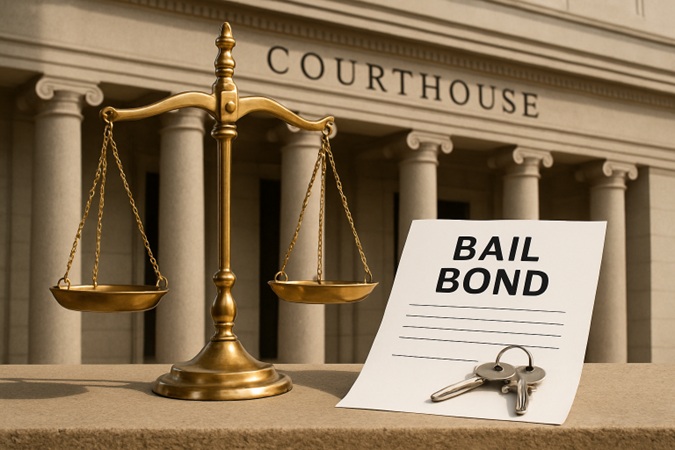Bail bonds are a vital part of the justice system, balancing the rights of the accused with societal interests. They help individuals navigate legal processes, often determining freedom before trial. Securing a bail bond upholds innocence and allows people to maintain jobs and family duties. Bail bonds also reduce jail overcrowding, ensuring responsible use of public resources. As fairness in the legal process gains importance, understanding their role in justice is crucial for legal reform.
Table of Contents
Understanding Bail Bonds
Bail bonds are settlements used as a guarantee that a defendant will appear in court for scheduled hearings. When an individual is charged with a crime, the court might require a financial surety—bail—to reduce the risk of flight while protecting the defendant’s right to freedom before conviction. If the accused cannot afford the full bail amount, a bail bondsman agent Tennessee can step in to post the bail on their behalf. In exchange, defendants pay a non-refundable fee, typically 10% of the total bail amount, to the agency. This process ensures that people of different financial means have a chance at pretrial release and the opportunity to prepare an adequate defense.
The Role Of Bail Bond Agencies
Bail bond agencies act as crucial intermediaries in the justice system. They assess risks, post court funds, and secure defendants’ release, considering factors like charges and community ties. Bail bonds allow individuals to return to work, support families, and consult attorneys—key for a fair defense and avoiding detention’s long-term effects. Agencies also monitor defendants’ court dates to ensure compliance and prevent failure to appear.

Impact On Pretrial Detention
In the United States, pretrial detention rates remain a significant concern, both in terms of their human cost and the expense to local governments. Bail bonds directly address this issue by providing a pathway for release. Jurisdictions with accessible bail options tend to have lower pretrial jail populations. This not only benefits those released but also relieves pressure on local jails, reducing incidents of overcrowding and the likelihood of adverse conditions for detainees.
Economic Implications
The personal costs of pretrial detention are considerable. Defendants may lose their jobs, face eviction, and experience severe financial and psychological hardship during incarceration. Bail bonds offer a critical lifeline: by securing release, individuals can maintain steady employment, support dependents, and avoid the destabilizing effects of even short-term jail stays. For local and state governments, reducing pretrial detention translates directly to cost savings. Housing inmates is profoundly expensive and strains public budgets—an issue exacerbated by unnecessary or prolonged pretrial incarceration.
Recent Legislative Changes
Reform in bail practices has become a focal point amid concerns about economic and racial disparities within the justice system. In 2023, Illinois led the nation by eliminating cash bail, replacing it with a system focused on risk assessments rather than financial resources. This shift, part of the Pretrial Fairness Act, aims to eliminate the practice of detaining individuals before trial solely because they are unable to pay. Other states are exploring similar models, recognizing the need for pretrial justice reforms that respect due process and promote equity.
Community Perspectives
Community-driven organizations have been at the forefront of bail reform and support. Groups like the Chicago Community Bond Fund not only provide financial support to individuals unable to secure bail but also advocate for systemic changes that address disparities in wealth, race, and access to legal resources. These organizations amplify the voices of marginalized communities, ensuring that the broader impact of pretrial detention is addressed in legislation and public debate. Their support networks often help defendants reintegrate into their communities, promoting social cohesion and a more profound sense of justice for all residents.
Technological Advancements In Bail Processes
The bail bonds industry is rapidly evolving with the help of technology. Many agencies now offer digital applications, court date reminders via text or app, and secure electronic payment options. Courts and agencies are also utilizing artificial intelligence-driven risk assessment tools to inform judges’ decisions about pretrial release. Additionally, electronic monitoring—such as GPS ankle bracelets—enables defendants to remain active in their communities under specified conditions, ensuring court appearance while minimizing risk. These innovations not only enhance efficiency but also help in tailoring pretrial conditions to the specifics of each case, reducing unnecessary detention while maintaining public safety.
Conclusion
Bail bonds are essential to a just and balanced legal process. They uphold the principle of presumed innocence while providing vital support to individuals, families, and communities. As legislative reforms and technology reshape the industry, the focus remains on ensuring pretrial fairness and minimizing the destructive impacts of unnecessary detention. Continued efforts toward reform and modernization, informed by both data and grassroots advocacy, will be crucial to achieving a justice system that truly serves everyone.







No Comments